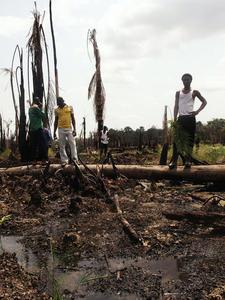By Edith Ike-Eboh
“I lost my two children to cholera, I can only see with one of my eyes because of the effects of oil production here in Kula, Akuku Toru Local Government Area of Rivers.
“I am happy today because I can now fetch water from a tap, thanks to the builders of the water plant in Kula; if this has been available, I would not have lost my two boys,’’ Mrs Agnes Hamilton, 54, lamented.
Hamilton, is one, among so many women, who suffered the consequences of non-implementation of Joint Venture Agreements by oil companies and its partners for the development of oil-rich Niger Delta host communities.
Oil exploration and production are associated with substantial environmental risks and sensitivities and require delicate but deliberate management.
Failure to manage properly, usually have dire consequences on the environment, society and energy users.
To minimise these externalities, oil companies worldwide adopt a structured approach involving a combination of partnership, responsible operations, corporate social responsibility to the host communities and local capacity building.
Over the years since crude oil was discovered in commercial quantity in Oloibiri, now in Bayelsa in 1956, negligence and alienation of host communities have precipitate crises of great dimensions, hindering smooth exploration.
Oil exploration in the Niger Delta region had often been resisted by the host communities due to large scale environmental degradation, arising from the exploitative activities of oil companies.
While the activities of these companies elsewhere were characterised by strict environmental quality considerations, in the Niger Delta, their operations were crude, evidenced by prolonged gas flaring and oil spillage, with adverse effects on the environment and economic activity in the region.
Experts have stressed the need for effective legislation that would engender economic growth and development in the region.
For over two years, the Oil Mining Lease (OML) 25 Flow, had been shut down and Shell that operates in the community-driven out of the flow station by the women and youths in the community.
Malam Mele Kyari, the Group Managing Director, Nigerian National Petroleum Corporation (NNPC), said that the country lost about 1.7 billion dollars due to the closure of the flow station that produces 35,000 barrels of crude per day.
This is one among many other oil wells that have operational challenge due to poor implementation of policies that would drive development in the host communities.
The Petroleum Industry Bill, not yet passed into law, would have helped all parties to ensure implementation of policies.
For instance, the Petroleum Host and Impacted Communities Development Bill 2018, called the “Host Community Bill,” is made up of six parts, with major focus on how to finance and execute projects for the benefit and sustainable development of the settlor’s host and impacted communities; to support healthcare development for the settlor’s host and impacted communities.
Also, it is to facilitate economic empowerment opportunities in the settlor’s host and impacted communities; and to undertake the infrastructural development of the settlor’s host and impacted communities within the scope of funds available to the Board of Trustees for such purposes.
For non-assent to this bill, the country had continued to witness pipelines breaks, obstruction of operation which in turn affects revenue generation and economic growth.
“If this bill has been passed by the National Assembly, the region would have seen a difference in development.
“But unfortunately, that has not been done, and we seriously need the political will to do so, for the development of that region as well as the oil and gas sector in the country,’’ said Mr Joshua Adeola, an energy expert.
But the Minister of State for Petroleum Resources, Mr Timpire Slyva, said that there is the need to adopt new ways of doing business in the Niger Delta host communities in order to attract investors.
He said that peace and strong community development projects were key to achieving a result in the sector.
“We need unity in the land today, and it is time for us to change strategy on our engagements to bring investment to our communities.
“If we cannot make our communities peaceful, investors will not come. It is our responsibility to bring peace to our communities for investment to come because investors are willing to come.”
He noted that through peaceful engagements, oil-producing communities in the Niger Delta could earn more revenue from oil and gas investment opportunities.
According to him, there will be more developments as against the constant cases of hostility, disruption of oil production and underdevelopment.
In the same vein, Kyari said that the NNPC as a major stakeholder had adopted a strategy of constant engagement of host communities to ensure lasting peace for effective oil production in the country.
“Community engagement is the solution to resolving a dispute with oil-producing communities.
“We have found a solution, and this would enable people to go back to their work; offer social services and all that is needed will come back.’’
For people like Asari Dokubo, a popular Niger Delta youth leader, all relevant laws and policies that would drive the development of the Niger Delta region must be conformed with, to stop all kinds of community crises that destabilise exploration in the region.
He believes that“ he who owns the land, owns what is on the land, and what is above the land.
“Getting the communities to participate and whatever laws that are made must affect the people positively, which, over the years have not affected us,’’ he said
With sustained peace and participation of host communities in the exploration of oil in the Niger Delta region by the oil companies, hostility, militancy, among others would come to an end. (NAN)




